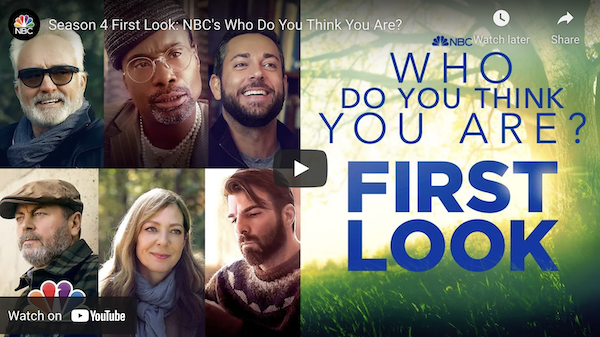The following announcement was written by NBC Broadcasting:
The moving television series Who Do You Think You Are? is returning for season 11 after a four year hiatus, and the new promo for the show revealed the emotional journeys of the six celebrities who researched their family histories. On the show, celebrities trace their family trees in an attempt to piece together the stories of their ancestors with the help of historians, genealogists, and other experts. Their visits to locations in the United States and all over the world unearth new discoveries about their genealogy and breathe new life into the stories of the people who came before them. Sometimes the celebrities even meet relatives they never knew they had.

The Emmy-nominated series Who Do You Think You Are? premiered on March 5, 2010 on NBC, where it ran for three seasons, until it moved to TLC. It aired for seven more seasons on that channel but now returns to NBC for season 11. The series is executive produced by Lisa Kudrow and Dan Bucatinsky. This season features the experiences of Allison Janney, Zachary Levi, Nick Offerman, Billy Porter, Zachary Quinto, and Bradley Whitford as they take a trip back in time to research their lineage.
The NBC promo for Who Do You Think You Are? season 11, (season 4 on NBC), gives a first look at the journeys of the six celebrities. It begins with a narrator stating, "Everyone has questions about their ancestors," and includes clips from the episodes. The narrator goes on to say, "This season on Who Do You Think You Are?, six celebrities will embark on a global search for answers, and will be forever changed by what they find." Each celebrity has a very different family history, but all of the experiences appear to have been emotional and life-changing.

Watch the Who Do You Think You Are? promo video here.
The promo features Bradley Whitford asking, "Were they running from something or to something?" Nick Offerman asks, "How could all of these family members condone this behavior?" He later studies a document and says, "Revolutionary War. Not a big deal," chuckling in amazement. Zachary Levi states, "All of the dysfunction in our lives, you can trace through your lineage. I don't know. Who knows what I'm about to find out." He is later shown reading a document in disbelief, saying, "Oh, oh, oh, oh! Guilty of witchcraft?! Oh my gosh!" As Allison Janney examines a record, she says, "He was wrecked off Bermuda. Are you kidding me?" Zachary Quinto states, "I feel like a much more complete version of myself." He is later shown hugging a man. Billy Porter reads a death certificate of a person from Pennsylvania and marvels, "33? Jesus. He died when he was 33?" In a powerful moment, he later states, "These are the shoulders that I stand on."
Who Do You Think You Are? season 11 carries on the legacy of the show, which is to uncover the personal stories of the ancestors of celebrities, while also shining a light on American and world history. These six celebrity stories are sure to be emotional and exciting. Who Do You Think You Are? is a show that teaches people just as much as it moves and inspires them.
 Latest News Articles
Latest News Articles Do you have an RSS newsreader? You may prefer to use this newsletter's RSS feed at:
Do you have an RSS newsreader? You may prefer to use this newsletter's RSS feed at: